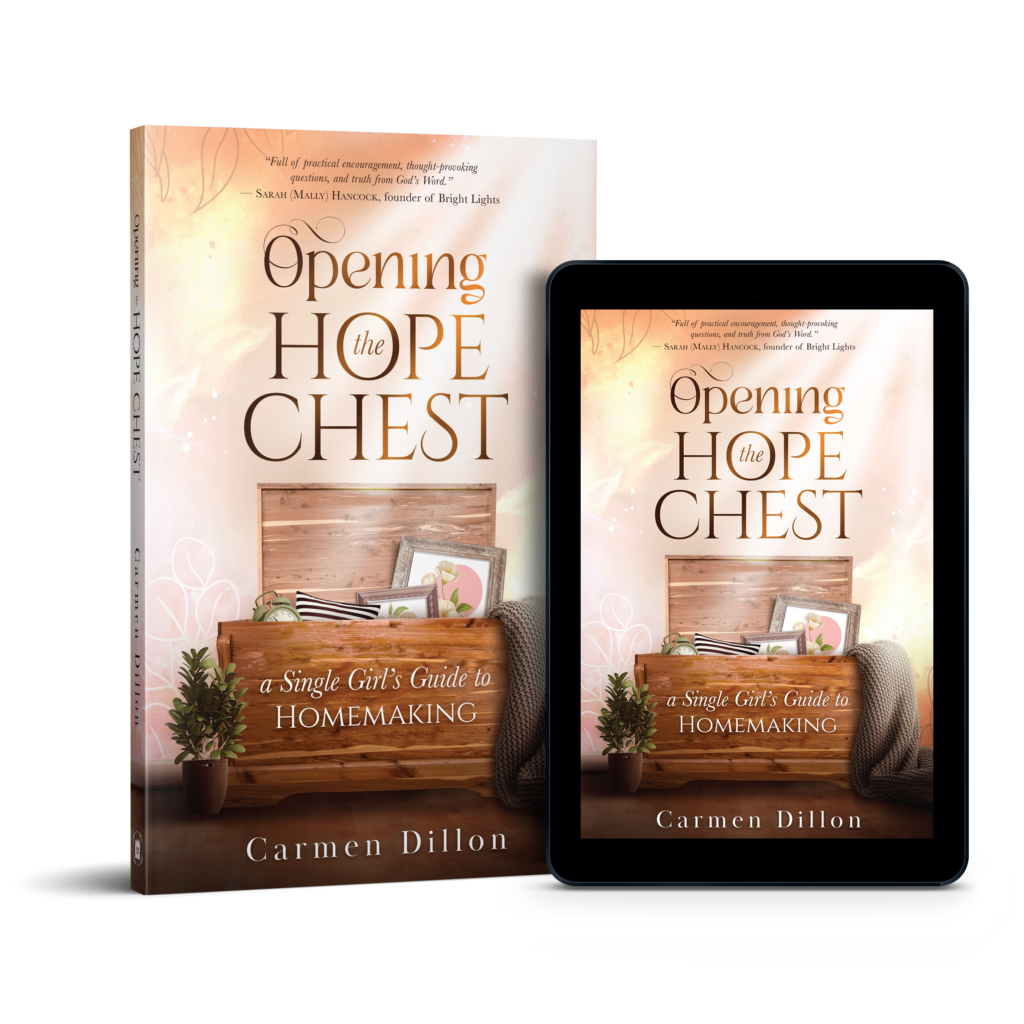
As I was doing research for my book Opening the Hope Chest: A Single Girl’s Guide to Homemaking, I came across a statement from Shaunti Feldhahn that jolted me:
“It turns out that divorce rates are falling mostly because people are getting married at older and more stable ages!”[1]
In churches across America, marriage is celebrated, as it should be. When a couple celebrates a fifty-year or sixty-year anniversary, we make a big deal about it. Although it is absolutely right to celebrate those milestones, those celebratory moments can cause the single heart to quake just a little. As the years pass without meeting a spouse, we realize we may not reach such big anniversaries even if we do get married.
In some circles, men and women are encouraged to marry young. After all, Solomon encouraged his son, “Rejoice with the wife of thy youth” (Proverbs 5:18 {KJV}). Settling down at a young age is considered a way to prevent temptations, be more effective in ministry, and enable couples to have many children.
God does lead many people to get married in their early twenties, and some marry even earlier. My great-grandparents married extremely young, and they experienced over seventy years of marriage. My grandparents met at a Christian high school and married during college. They have been married for over sixty-five years. Their dedication is an inspiration.

Shifting Trends
However, there are many people who experience longer seasons of singleness. According to the United States Census Bureau, the median age for first-time marriages in 2023 was 30.2 years for men and 28.4 years for women.[2] A survey of 10,000 people by The Knot found the average age of marriage in 2023 to be 32.[3]
Even by those standards, I am “running late” at the age of thirty-three. And I have several friends in their mid to upper-thirties who are still single as well. Is this a bad thing? Is there something wrong with us? Shouldn’t we have gotten married ten years ago?
These questions made Shaunti’s positive statement about getting married later in life so jolting to me. You mean getting married later can be a good thing?
Growing in Seasons of Singleness
As I reflected on where I am spiritually and emotionally, I found that Shaunti had a point. As much as I thought I was ready for marriage in my early twenties, I know that I am much more equipped to succeed in marriage now. Here are some key ways I have grown since my mid-twenties.
- Learning that my relationship with God is more fulfilling than a relationship with a man. My single years have forced me to find my sufficiency in Christ. Although I want to be married, I know a man cannot fulfill my deepest needs and desires to be truly known and loved. Only God can. If I do get married, I know I should not expect my husband to fill needs that only God can fill. This would make for a better relationship because I am not setting an expectation that my husband would only fail to meet, causing hurt and frustration for both of us.
- Learning the strengths and weaknesses of my personality. In the last few years, I have learned more about my unique design. For example, I am an introvert. After stimulating events, I need quiet time to recharge. There are also boundaries I need to set in my ministry and social life to be effective in God’s callings. Learning how God has designed me has pushed me to become the healthiest version of myself. This extends to other areas of my personality, such as a drive to be morally good and perfectionistic, which has both benefits and pitfalls. Marrying after I have figured out these things enables me to be a more effective wife. When conflicts arise, I will better understand my personal triggers and how to manage them.
- Learning about God’s callings on my life. In my early twenties, I thought I could simply marry a good, godly man who loved the Lord and would raise his children to love the Lord. It did not matter if he was an engineer or a pastor. Over ten years later, I know that God has called me to ministry. If I do marry, it must be to a man whose heartbeat is also ministry. I do not know exactly what that will look like, but I know that my priorities and my husband’s priorities must be the same. Otherwise, we will each be pulling in different directions and constantly be frustrated. A good marriage involves two people serving the Lord together, joyfully supporting each other in their respective callings.
Whether we marry early or later in life, we will likely learn all these things. Marriage has a way of bringing these things to the surface. As I discussed these ideas with my mom, she made an interesting point:
“Yes, you learn and grow a lot in marriage, but it comes with hurts and scars for both of you. Learning these things now—before marriage—means you and your spouse will not have all the hurts and scars you would have if you married earlier.”
Mom’s insight encouraged me. It gave me hope that if God does have me marry one day, my marriage will be stronger because of my longer season of singleness.
Celebrating God’s Individual Plan
Some people marry young, and some people marry later. The age at which we marry (or whether we marry at all) is not indicative of our value or level of spirituality. What matters is that we pursue Christ and grow to become the person God designed us to be. What matters is that we treat people in a way that is kind and honoring. What matters is that we share the hope of the Gospel with the world God places us in.
When discussing whether to marry or not marry and the timing of marriage, Paul gives this encouragement:
“But as God hath distributed to every man, as the Lord hath called every one, so let him walk” (1 Corinthians 7:17 {KJV}).
Instead of comparing ourselves to others, let us be confident in the path God has placed us on. Let us celebrate the marriage milestones God gives to others, and let us celebrate the milestones and growth God gives us as singles.
Our good God knows exactly where we are, and His timing is always perfect.
[1]. Shaunti Feldhahn (2016), “Why Not Take the Test Drive? The Case against Cohabitation,” Shaunti Feldhan, https://shaunti.com/2016/02/why-not-take-the-test-drive-the-case-against-cohabitation/.
[2]. United States Census Bureau, 2023, “Historical Marital Status Tables,” https://www.census.gov/data/tables/time-series/demo/families/marital.html.
[3]. Esther Lee, 2024, “Here’s the Average Age of Marriage in the US, According to Data,” The Knot, https://www.theknot.com/content/average-age-of-marriage.
Copyright © 2024 by Carmen Dillon. All rights reserved.
Check out tips for enjoying singleness in chapter 14 of my book Opening the Hope Chest: A Single Girl’s Guide to Homemaking.
Share this encouragement with someone.


Good points here about learning to know yourself. And the focus on our relationship with Jesus is paramount.
Thank you! Yes, our relationship with Christ is the most important relationship of all.